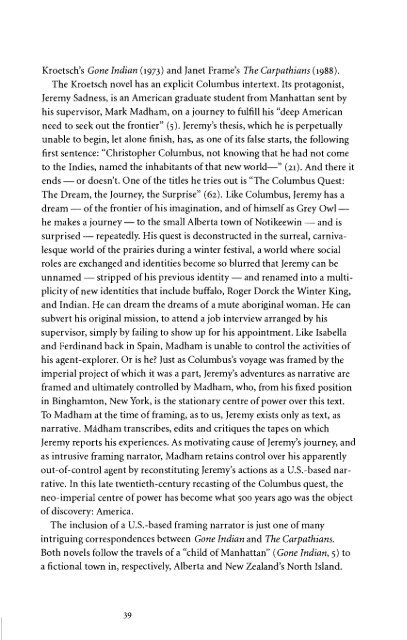The Carpathians - University of British Columbia
The Carpathians - University of British Columbia
The Carpathians - University of British Columbia
You also want an ePaper? Increase the reach of your titles
YUMPU automatically turns print PDFs into web optimized ePapers that Google loves.
Kroetsch's Gone Indian (1973) and Janet Frame's <strong>The</strong> <strong>Carpathians</strong> (1988).<br />
<strong>The</strong> Kroetsch novel has an explicit Columbus intertext. Its protagonist,<br />
Jeremy Sadness, is an American graduate student from Manhattan sent by<br />
his supervisor, Mark Madham, on a journey to fulfill his "deep American<br />
need to seek out the frontier" (5). Jeremy's thesis, which he is perpetually<br />
unable to begin, let alone finish, has, as one <strong>of</strong> its false starts, the following<br />
first sentence: "Christopher Columbus, not knowing that he had not come<br />
to the Indies, named the inhabitants <strong>of</strong> that new world—" (21). And there it<br />
ends — or doesn't. One <strong>of</strong> the titles he tries out is "<strong>The</strong> Columbus Quest:<br />
<strong>The</strong> Dream, the Journey, the Surprise" (62). Like Columbus, Jeremy has a<br />
dream — <strong>of</strong> the frontier <strong>of</strong> his imagination, and <strong>of</strong> himself as Grey Owl —<br />
he makes a journey — to the small Alberta town <strong>of</strong> Notikeewin — and is<br />
surprised — repeatedly. His quest is deconstructed in the surreal, carnivalesque<br />
world <strong>of</strong> the prairies during a winter festival, a world where social<br />
roles are exchanged and identities become so blurred that Jeremy can be<br />
unnamed — stripped <strong>of</strong> his previous identity — and renamed into a multiplicity<br />
<strong>of</strong> new identities that include buffalo, Roger Dorck the Winter King,<br />
and Indian. He can dream the dreams <strong>of</strong> a mute aboriginal woman. He can<br />
subvert his original mission, to attend a job interview arranged by his<br />
supervisor, simply by failing to show up for his appointment. Like Isabella<br />
and Ferdinand back in Spain, Madham is unable to control the activities <strong>of</strong><br />
his agent-explorer. Or is he? Just as Columbus's voyage was framed by the<br />
imperial project <strong>of</strong> which it was a part, Jeremy's adventures as narrative are<br />
framed and ultimately controlled by Madham, who, from his fixed position<br />
in Binghamton, New York, is the stationary centre <strong>of</strong> power over this text.<br />
To Madham at the time <strong>of</strong> framing, as to us, Jeremy exists only as text, as<br />
narrative. Mâdham transcribes, edits and critiques the tapes on which<br />
Jeremy reports his experiences. As motivating cause <strong>of</strong> Jeremy's journey, and<br />
as intrusive framing narrator, Madham retains control over his apparently<br />
out-<strong>of</strong>-control agent by reconstituting Jeremy's actions as a U.S.-based narrative.<br />
In this late twentieth-century recasting <strong>of</strong> the Columbus quest, the<br />
neo-imperial centre <strong>of</strong> power has become what 500 years ago was the object<br />
<strong>of</strong> discovery: America.<br />
<strong>The</strong> inclusion <strong>of</strong> a U.S.-based framing narrator is just one <strong>of</strong> many<br />
intriguing correspondences between Gone Indian and <strong>The</strong> <strong>Carpathians</strong>.<br />
Both novels follow the travels <strong>of</strong> a "child <strong>of</strong> Manhattan" (Gone Indian, 5) to<br />
a fictional town in, respectively, Alberta and New Zealand's North Island.

















